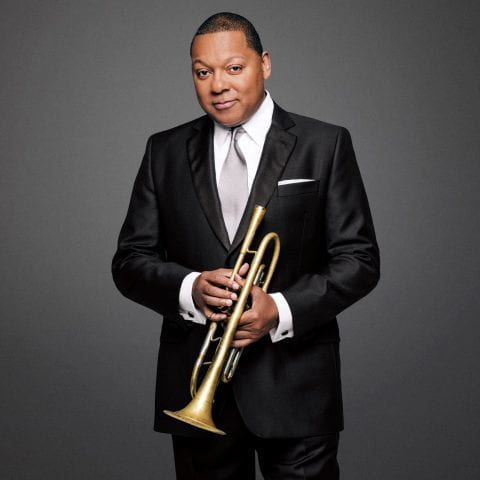Wynton Marsalis

Wynton Marsalis
Full visit: November 1-7, 2021
Full visit: March 22-28, 2018
- World-renowned trumpeter, bandleader, and composer
- Principal co-founder and Managing and Artistic Director, Jazz at Lincoln Center
- Director of Jazz Studies, The Juilliard School
- President, Louis Armstrong Educational Foundation
- ADW-PAL term: 2015-22
- Subject Area: Arts
- Faculty host: Steve Pond (Associate Professor, Dept. of Music)
- Faculty co-host: James Spinazzola (Associate Professor; Director of Winds, Dept. of Music)
Jazz legend & A.D. White Professor-at-Large Wynton Marsalis visits Cornell Nov. 2021
Wynton Marsalis (2015-22) is an internationally celebrated American musician, composer, bandleader, and educator, and artistic director, and principal co-founder of Jazz at Lincoln Center (JALC), which has evolved as the preeminent site for jazz in the United States. Under Marsalis’s leadership, Jazz at Lincoln Center has become one of the world’s most acclaimed jazz performance spaces and a center for research, advocacy, and educational programming in jazz studies and performance. Marsalis’s acclaimed career has brought important visibility to jazz as art form and cultural expression; his importance in vitalizing jazz in education and in the public mind cannot be overstated.
Marsalis’ core beliefs are based on jazz fundamentals: freedom and individual creativity (improvisation), collective action and good manners (swing), as well as acceptance, gratitude and resilience (the blues). Marsalis believes that music has the power to elevate our quality of life and lead us to both higher and lower levels of consciousness. He maintains that music can elevate the quality of human engagement for individuals, social networks and cultural institutions throughout the world.
Born into a prominent New Orleans jazz family, Marsalis has continued the legacy of great jazz musicians from the Crescent City. Marsalis’s work both references and extends these past masters yet captures the joy and adventure that were their hallmark. Artistically restless and tireless in his advocacy for jazz, Marsalis challenges historical divides between “classical” and “vernacular” musical art and between “elite” and “people’s” culture and has helped propel jazz studies into secondary and post-secondary education.
Marsalis’ bridging of the conceptual divides between “jazz” and “classical music” is prominently on display with such notable large works as the epic oratorio composition Blood on the Fields (1997), the string quartet At the Octoroon Balls (1999), the chamber work A Fiddler’s Tale (1999-a response to Stravinsky’s A Soldier’s Tale), All Rise (2002-a work for big band, gospel choir, and symphony orchestra), an extended multi-sectioned religious work (In this House, On this Morning, 1992) and two symphonies, (Blues Symphony, 2009; Swing Symphony, 2010). His catalog of more than seventy recordings includes three RIAA-certified Gold Records – a rare accomplishment in jazz. Marsalis has composed for the dance; he has written major works for the New York City Ballet, the American Ballet Theatre, Twyla Tharp Dance, and the Alvin Ailey American Dance Theatre.
His numerous national and international awards and other recognition, including the Pulitzer Prize for Music (1997) for the oratorio composition Blood on the Fields and eight Grammy Awards for his performances, recordings, and compositions (plus a ninth Grammy Award for a spoken-word children’s album). As is well known, Marsalis garnered Grammy Awards in both jazz and classical categories in 1983 (the first musician ever to have done so)—and then duplicated the distinction the following year. Additional honors are plentiful; among them are the National Medal of the Arts (2005), the Edison Jazz Award (Netherlands, 1984), the Grand Prix du Disque of France (2010), honorary membership (non-British citizen category) in Britain’s Royal Academy and some three-dozen honorary degrees from such universities as Columbia, Harvard, Howard, Princeton and Yale. Marsalis was proclaimed an international messenger of goodwill for the United States by appointing him a United Nations Messenger of Peace (2001).
In December 2020, Cornell Orchestras welcomed Marsalis as the final speaker in their series, “Racism in the Orchestra.”
In November 2021, Marsalis visited Cornell for a second time as an A.D. Professor-at-Large. Public events included a talk on “Democracy & the University” and “An Evening with A.D. White Professor-at-Large Wynton Marsalis and the Cornell Wind Symphony.”
